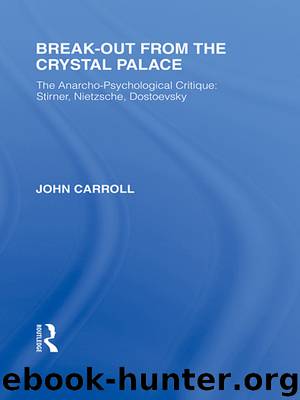Break-Out from the Crystal Palace by Carroll John

Author:Carroll, John [Carroll, John]
Language: eng
Format: epub
Tags: Humanities
Publisher: Taylor & Francis
Published: 2009-12-23T17:00:00+00:00
2 Ego, pp. 61–2. See my footnote 1 to p. 62, and the footnote to p. 222 which illustrates his further assault on accepted morality: ‘I do not renounce from any access of humility, even the power over life and death.’ Nietzsche also directed specific criticism at ‘moral fanaticism’ (e.g. Morgenröte, Vorrede, 3).
3 Ego (1912), pp. 430–2.
1 Ego, p. 64. Cf. Nietzsche’s attack on Kant as parson and decadent—Antichrist 10–11.
2 Wille 47.
3 Wissenschaft 125.
4 Götzen-Dämmerung vi:2.
1 Nietzsche gives some support to this interpretation in a general aphorism: ‘The most valuable insights are arrived at last; but the most valuable insights are methods’ (Wille 469).
2 T.W.Adorno: Minima Moralia, 1951, p. 57.
1 ‘Recensenten Stirners’ (1845); the relevant section is included in Ego, pp. 257–9.
2 E.g., Zarathustra, Vorrede 4.
3 Ego, pp. 257–9.
4 Following Danto’s convention in retaining the original German Übermensch rather than substituting either of the unhappy English translations, ‘superman’ or ‘overman’ (Arthur C.Danto: Nietzsche as Philosopher, 1965, pp. 196–7).
1 The ideal-type is closely analogous to the mathematical notion of the limit to which an infinite series converges, ever more closely, but without ever quite reaching. It is a convenient tool for locating the series, and the salient feature of each of its elements, without being able to define fully any element.
2 Ego, pp. 117–18.
3 Martin Heidegger: Being and Time, 1962.
4 Ego, p. 241.
1 In recent years a neo-rationalist model of science has been constructed by Karl Popper which takes account of many of these limitations inherent in human understanding.
1 Again he directly anticipates a central Heideggerian concept: eigentlich, usually translated as ‘authentic’. Some sense of the measure of the debt to Stirner is conveyed by one of Heidegger’s definitions, from an essay of 1943, of what it means ‘to find’: ‘den Fund zu eigen bekommen, um in ihm als dem Eigentum zu wohnen’ (Erläuterungen zu Hölderlins Dichtung, Frankfurt, Klosterman, 1971, p. 14). The centrality of Stirner’s play on eigen (own) and Eigentum (property) will become apparent as we proceed.
2 W.R.D.Fairbairn: Psychoanalytic Studies of the Personality, 1952.
1 Ego, p. 218.
2 Zarathustra I:14 and 16.
1 Ego, p. 90.
2 Ibid., p. 238.
3 Wille 30, 215, and 925–6. It is worth noting that Nietzsche criticized George Eliot, and by implication the English in general, for imagining that she had done away with the Christian God, whereas, in fact, she clung all the more fiercely to its morality (Götzen-Dämmerung x:5). His attitude precisely mirrors that of Stirner to Feuerbach. Moreover, George Eliot was the first translator of Feuerbach into English, and even wrote in a letter dated 29/4/1854 to her friend and editor Sara Hennell: ‘With the ideas of Feuerbach I everywhere agree’.
4 Wille 62 and Jenseits 228.
5 Genealogie I:2.
6 Wille 864.
7 Götzen-Dämmerung i:12.
1 Jenseits 21.
2 Thomas Mann: Betrachtungen eines Unpolitischen, 1918.
3 On Stirner’s relationship to Bruno Bauer, see Brazill, op. cit., p. 213, and my first footnote to p. 90 of Ego. Bauer did clearly influence Stirner, but the quality of his written philosophy does not compare with that of his friend.
4 Arvon (op. cit., pp.
Download
This site does not store any files on its server. We only index and link to content provided by other sites. Please contact the content providers to delete copyright contents if any and email us, we'll remove relevant links or contents immediately.
Rewire Your Anxious Brain by Catherine M. Pittman(18656)
Talking to Strangers by Malcolm Gladwell(13370)
The Art of Thinking Clearly by Rolf Dobelli(10489)
Mindhunter: Inside the FBI's Elite Serial Crime Unit by John E. Douglas & Mark Olshaker(9343)
Becoming Supernatural by Dr. Joe Dispenza(8217)
Change Your Questions, Change Your Life by Marilee Adams(7783)
Nudge - Improving Decisions about Health, Wealth, and Happiness by Thaler Sunstein(7707)
The Road Less Traveled by M. Scott Peck(7603)
The Lost Art of Listening by Michael P. Nichols(7506)
Mastermind: How to Think Like Sherlock Holmes by Maria Konnikova(7347)
Enlightenment Now: The Case for Reason, Science, Humanism, and Progress by Steven Pinker(7314)
Win Bigly by Scott Adams(7199)
The Way of Zen by Alan W. Watts(6614)
Daring Greatly by Brene Brown(6514)
Big Magic: Creative Living Beyond Fear by Elizabeth Gilbert(5774)
Grit by Angela Duckworth(5615)
Ego Is the Enemy by Ryan Holiday(5450)
Men In Love by Nancy Friday(5240)
The Laws of Human Nature by Robert Greene(5208)
